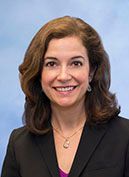Article
Nearly 1-in-3 of Physicians Could Be Overusing Thyroid Ultrasonography
Author(s):
A survey of more than 600 physicians found many endorsed the use of thyroid ultrasonography for clinically unsupported reasons.
Megan Haymart, MD

A new study from Michigan Medicine suggests physicians may be misusing and ordering unnecessary thyroid tests for patients.
A survey of endocrinologists, surgeons, and primary care physicians, investigators found nearly a third of all clinicians were ordering thyroid ultrasonography for reasons not supported by clinical guidelines, but those seeing fewer patients were less likely to order such tests.
“This study is the first to look at why physicians are using thyroid ultrasound for patients. While often it’s for clinically relevant reasons, a substantial number of physicians are not ordering them for reasons that are clinically supported,” said lead investigator Megan Haymart, MD, Nancy Wigginton Endocrinology Research Professor of Thyroid Cancer and professor of internal medicine at Michigan Medicine, in a statement from Michigan Medicine.
Concerned an increase in use of thyroid ultrasonography could be a misuse of resources and lead to potential overdiagnosis of thyroid cancers, Haymart and a team of colleagues sought to evaluate current trends in use among endocrinologists, surgeons, and primary care physicians in the US. To do so, the team sent surveys to physicians identified as endocrinologists, surgeons, and primary care physicians through the Surveillance, Epidemiology, and End Results (SEER) registries of Georgia and Los Angeles, California.
These surveys, which were sent between October 2018 and August 2019, asked physicians to select clinical scenarios where they would schedule a thyroid or neck ultrasonography exam. Physicians were also asked to select what data sources had the greatest influence on their decision-making, such as clinical guidelines, meetings, experts, training, colleagues, journal articles, and employer guidelines.
In total, 65% of physicians responded to the investigators’ survey, yield a cohort of 610 responders for their analysis. Of these 605, 176 were endocrinologists, 162 were primary care physicians, 134 were general surgeons, and 130 were otolaryngologists. Of note, the respondents were responsible for treating 74% of the previously surveyed 2014-2015 SEER cohort.
Investigators pointed out 66% of respondents were men, 67.3% self-identified as White, 59.6% worked in private practice, and 69.7% reported reading the 2015 American Thyroid Association management guidelines or the 2017 National Comprehensive Cancer Network (NCCN) Clinical Practice Guidelines in Oncology–Thyroid Carcinoma in the past. Furthermore, 49.6% reported reading the ATA guidelines alone, 5.3% reported reading the 2017 NCCN guidelines alone, and 17.6% reported reading both guidelines.
Analysis of survey results indicated98.2% of respondents reported use of ultrasonography for palpable nodules, 91.8% reported use for large goiter, 88.1% reported use for nodule seen on another imaging test, and 65.8% reported use for new-onset hoarseness or compressive symptoms—all of which are clinically supported reasons.
While 69.3% of respondents reported clinical guidelines as having the greatest influence on their decision-making, survey results also indicated physicians endorsed tests for multiple clinically unsupported reasons. Specifically, investigators found 32.7% endorsed use based on patient request, 28.0% endorsed used based on abnormal thyroid function test results, and 22.5% endorsed use based on positive thyroid antibody test results. Additionally, 3 physicians endorsed use of ultrasonography for fatigue, but no physicians endorsed use for routine well-patients visits.
In multivariable logistic regression analysis, investigators found endocrinologists (OR, 2.46; 95% CI, 1.22-4.97), otolaryngologists (OR, 2.87; 95% CI, 1.49-5.54), and general surgeons (OR, 2.20; 95% CI, 1.19-4.06) were more likely to schedule an examination based on a patient request than primary care physicians. Further insight from the analysis revealed physicians managing 10 or fewer patients with thyroid nodules per year were less likely to schedule an examination for positive thyroid antibody test results compared to physicians managing more than 50 of these patients (OR, 0.41; 95% CI, 0.18-0.93).
“There’s so much emphasis in medicine on patient satisfaction. You do want patients to be satisfied, but physicians also have to do what’s medically appropriate,” she says. “Developing decision aids could help patients understand and decide when thyroid ultrasound is appropriate and when it’s not,” Haymart added in the aforementioned statement.
This study, “Physician-Reported Misuse of Thyroid Ultrasonography,” was published as a research letter in JAMA Surgery.



